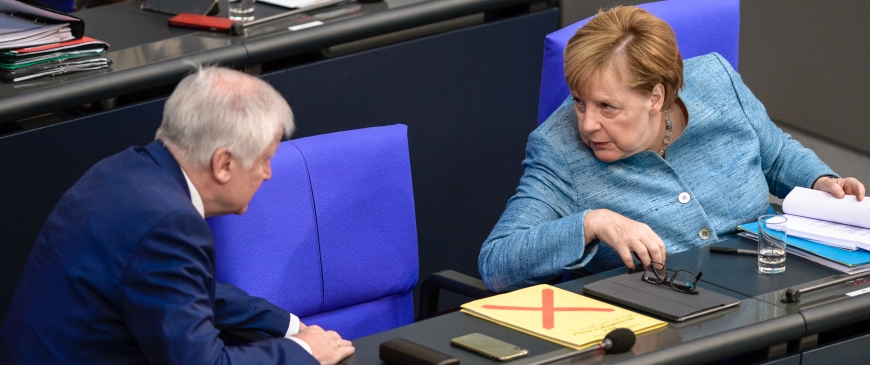
The Bavaria election results show that Merkel's liberal, centrist approach is appealing to German voters
The political landscape in Germany, as in other European countries, is becoming more fragmented as the catch-all parties that have dominated politics for decades decline.
Chancellor Angela Merkel may prove to be the unlikely winner after voters delivered a crushing blow to her testy coalition partner in regional elections in Bavaria. The Christian Social Union (CSU) lost their absolute majority in the south German parliament for only the second time since 1962 after its anti-immigrant and anti-European campaign backfired. If the CSU emerges chastened and returns to a more moderate course, it will make life much easier for Merkel.
It was a horrible election for the CSU, which forms a single parliamentary group with Merkel’s Christian Democratic Union (CDU) at the national level. It saw its vote share drop to a historic low of 37.2 per cent, a loss of more than 10 percentage points from the last elections in 2013. Meanwhile, the Social Democrats (SPD), the third party in Merkel’s ‘grand coalition’, plummeted to 9.7 per cent from 20.6 per cent.
Contrary to what many commentators suggest, the election turned out to be a referendum on the CSU’s anti-Merkel course, rather than on Merkel herself. Under pressure from the nativist Alternative for Germany (AfD), the CSU chose to imitate the far-right party’s anti-immigrant and anti-European rhetoric. The CSU’s Bavarian Premier, Markus Söder, accused refugees of being asylum-tourists in search of the best benefits, pleaded for the end of multilateral cooperation, and ordered crucifixes to be displayed in all state buildings. At every opportunity, the CSU picked fights with Merkel, who they despise for her comparatively liberal refugee policy. During the summer, quarrels over border controls and a scandal involving a spy chief brought the government in Berlin twice to the brink of collapse.
The open hostility during the Bavarian elections has raised the question of the future direction of the German conservatives, especially since this is widely believed to be Merkel’s last term. Should the union of CSU and CDU stay on Merkel’s liberal, centrist course or return to more traditional, right-wing positions?
While the Bavarian election gives no definitive answer, the debacle for the CSU shows that parroting the far-right is not only ineffective but counterproductive. The CSU failed to win back disgruntled conservative voters who had flocked to the AfD, but also lost liberal and catholic voters primarily to the Greens. This will strengthen the hand of Merkel and her supporters who argue that elections in Germany can only be won by occupying the centre ground.
Alongside the collapse of the CSU and SPD, the other big story of the election was the rise of the Greens and the AfD. The cosmopolitan Greens almost doubled their votes to 17.5 per cent and the nationalist AfD entered the parliament for the first time with a sizeable yet than less than expected vote share of 10.2 per cent. The Bavarian elections show the political landscape in Germany, as in other European countries, is becoming more fragmented as the catch-all parties that have dominated politics for decades decline.
The election results also challenge the prevailing narrative that Germany is inevitably moving to the right of the political spectrum. The stunning result for the Greens shows that an unapologetically pro-immigrant and pro-European party can still succeed in European politics. By contrast the AfD’s popularity in Bavaria and Germany as a whole remains more limited than the media attention might suggest, with recent national polls putting their support at around 16 per cent. Tellingly, climate change ranked considerably higher in voters’ concerns in Bavaria, with 49 per cent saying it was very important to them, compared with 33 per cent citing refugee policy.
On a regional level the CSU will probably link up with the Free Voters, a conservative localist party, to form a government in Bavaria. But the more important consequences of the election will probably be felt in Berlin. Horst Seehofer, the CSU leader and interior minister, who has proved a constant thorn in Merkel’s side, will be under pressure to consider his position or change track. The Bavarian losses could lead the CSU to take a more conciliatory course which would take pressure off Merkel.
Whether that shift will be enough to ensure the survival of the grand coalition remains unclear. Voices in the SPD calling for an end of the coalition in Berlin, which they see as suffocating their electoral chances, are becoming louder and the German public seems fatigued of Merkel’s incremental style of politics.
Much will depend on how the SPD and CDU perform in the next regional election in Hesse on 28 October. But what the Bavarian elections demonstrate is that the obituaries for Merkel’s leadership might have been written prematurely. Even if her coalition has no long-term prospects, Merkel’s centrist conservative course does.
Leonard Schuette is the Clara Marina O’Donnell fellow (2018-19) at the Centre for European Reform.
